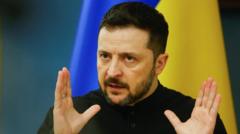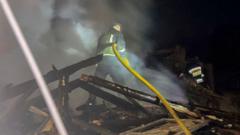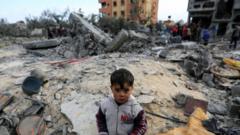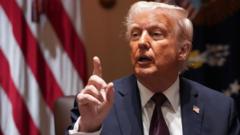The article explores President Zelensky's recent Paris visit amid discussions for security guarantees for Ukraine, contrasting it with his past challenges in the US and addressing the broader implications of shifting alliances.
**Zelensky's Optimism in Paris: A Complex Response to Security Challenges in Ukraine**

**Zelensky's Optimism in Paris: A Complex Response to Security Challenges in Ukraine**
Ukrainian President Volodymyr Zelensky exudes confidence during diplomatic efforts in Paris while facing a shifting European security landscape and uncertain American support.
Despite the gravity of the situation, Ukrainian President Volodymyr Zelensky left Paris glowing after a meeting with French President Emmanuel Macron and journalists from various European nations. The Eiffel Tower, illuminated in Ukraine's national colors, set the stage for Zelensky's visit. He was there to engage leaders from 30 nations, contributing to a "coalition of the willing" aimed at providing Ukraine with the security assurances necessary for any potential long-term ceasefire.
This visit was a stark contrast to Zelensky's contentious experience at the White House in the previous month, where he faced criticism from President Donald Trump and Vice President JD Vance, ultimately leading to the suspension of American military aid. Following this, Zelensky adopted a conciliatory approach towards Trump, aligning with the demands of the administration to gain back military support. With the aid now restored, unease remains among Ukraine and its European allies regarding the reliability of American commitment.
Zelensky expressed confidence in the initiatives emerging from Western Europe, particularly emphasizing the increasing defense budgets of the UK, France, and Germany. He optimistically projected that European defense capabilities might eventually match those of the United States within three to five years. However, he acknowledged the risks given the historical dependence on American support, underscored by Trump’s recent decisions.
The article notes a significant aspect of the ongoing negotiations. Russia, under President Vladimir Putin, has outlined preconditions for a ceasefire involving economic concessions such as lifting sanctions. Despite Trump's past reluctance to criticize Russian actions, he has acknowledged delays in negotiation progress, indicating a divide in the diplomatic landscape.
Zelensky emphasized that the U.S. must remain steadfast against Russian demands, asserting the importance of American military intelligence being consistently available to Ukraine. He relied on previous U.S. cooperation, despite his reservations about the current administration's agenda leaning towards Moscow.
Criticism surfaced from Trump’s envoy Steve Witkoff regarding the coalition, characterizing it as performative. Zelensky defended the European initiative and condemned Witkoff’s assertions as being influenced by Russian narratives.
The article concludes with a poignant reflection from Zelensky about the future of his country. He expressed hope for bringing peace, underscoring the long-term perspective he's adopted amid the pressures of war, and reaffirmed his commitment to defend Ukraine against external threats. As discussions among world leaders unfold, Zelensky remains cautiously hopeful, with an eye towards a protracted future of resistance and resilience.
This visit was a stark contrast to Zelensky's contentious experience at the White House in the previous month, where he faced criticism from President Donald Trump and Vice President JD Vance, ultimately leading to the suspension of American military aid. Following this, Zelensky adopted a conciliatory approach towards Trump, aligning with the demands of the administration to gain back military support. With the aid now restored, unease remains among Ukraine and its European allies regarding the reliability of American commitment.
Zelensky expressed confidence in the initiatives emerging from Western Europe, particularly emphasizing the increasing defense budgets of the UK, France, and Germany. He optimistically projected that European defense capabilities might eventually match those of the United States within three to five years. However, he acknowledged the risks given the historical dependence on American support, underscored by Trump’s recent decisions.
The article notes a significant aspect of the ongoing negotiations. Russia, under President Vladimir Putin, has outlined preconditions for a ceasefire involving economic concessions such as lifting sanctions. Despite Trump's past reluctance to criticize Russian actions, he has acknowledged delays in negotiation progress, indicating a divide in the diplomatic landscape.
Zelensky emphasized that the U.S. must remain steadfast against Russian demands, asserting the importance of American military intelligence being consistently available to Ukraine. He relied on previous U.S. cooperation, despite his reservations about the current administration's agenda leaning towards Moscow.
Criticism surfaced from Trump’s envoy Steve Witkoff regarding the coalition, characterizing it as performative. Zelensky defended the European initiative and condemned Witkoff’s assertions as being influenced by Russian narratives.
The article concludes with a poignant reflection from Zelensky about the future of his country. He expressed hope for bringing peace, underscoring the long-term perspective he's adopted amid the pressures of war, and reaffirmed his commitment to defend Ukraine against external threats. As discussions among world leaders unfold, Zelensky remains cautiously hopeful, with an eye towards a protracted future of resistance and resilience.






















